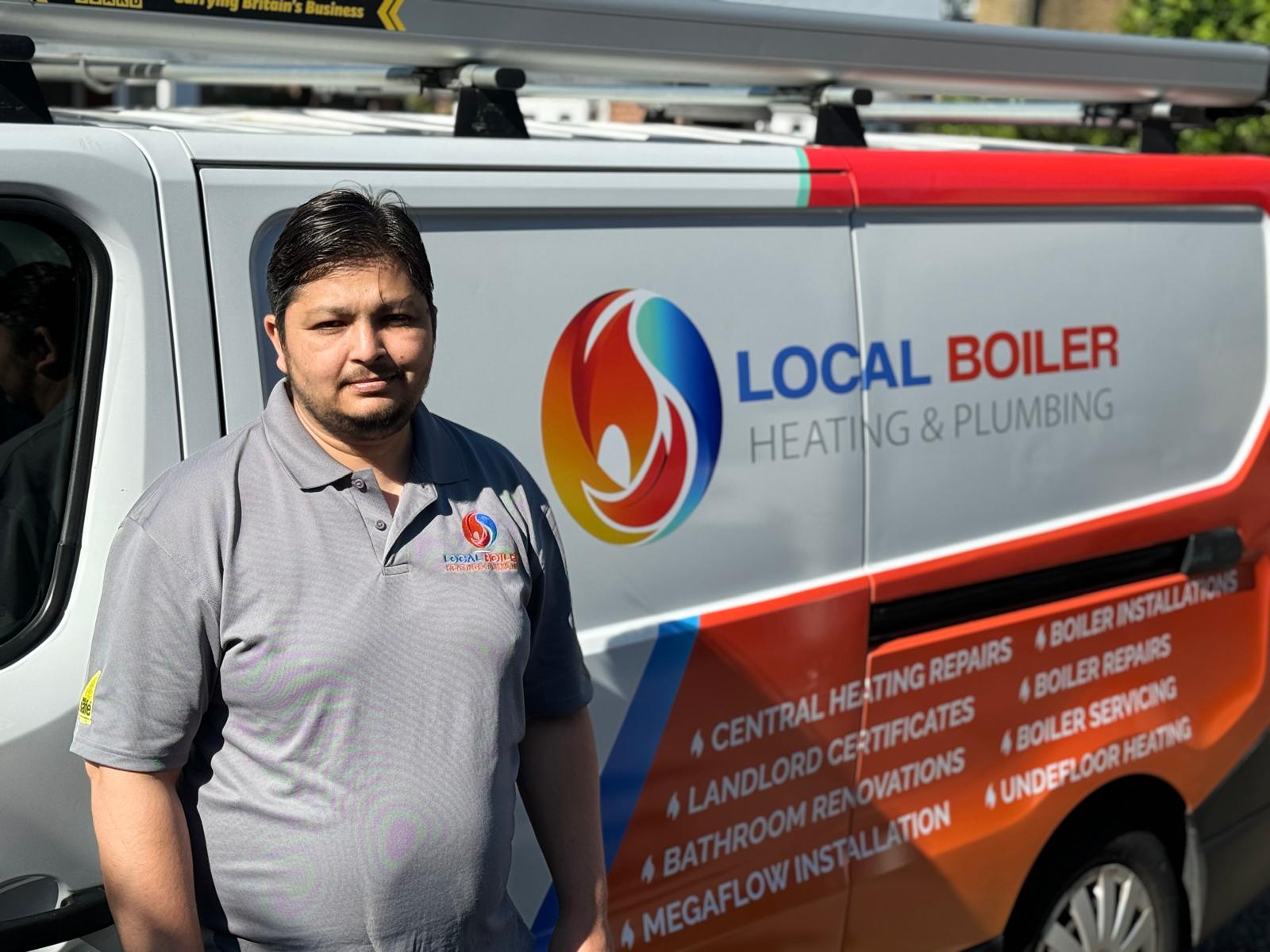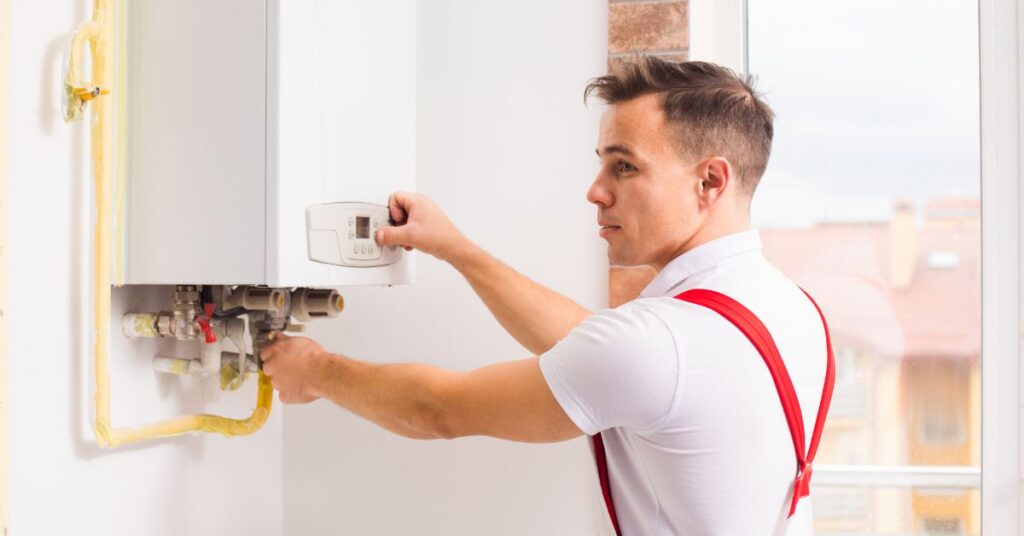Combination boilers (commonly referred to as combi boilers) provide heating and hot water directly from one unit without separate tanks or cylinders – becoming increasingly popular in homes where space is at a premium. Furthermore, their on-demand heat guarantees you always have hot water available when needed.
Purpose: Why People Choose Combination Boilers
People choose combination boilers primarily due to their convenience, efficiency and space-saving design. Traditional heating systems require both a hot water cylinder and cold water storage tank that take up valuable floor space; in contrast to these conventional methods, combi boilers combine both functions into one device, making it the ideal solution for smaller homes or apartments where space may be at a premium.
Furthermore, due to their energy-efficient energy-efficient designs, they make attractive investments for environmentally aware homeowners hoping to lower energy consumption and utility bills.
Also Check: – Boiler Repair London
Key Benefits
Energy Efficiency: Combi boilers are known for their exceptional energy efficiency ratings of 90% or above, meaning they convert a significant proportion of their fuel usage directly to heat production, decreasing wasteful energy use while cutting your bills significantly.
Space Saving: Thanks to their compact footprint and lack of separate hot and cold water storage tanks, combi boilers save valuable floor space in smaller properties with limited room available for these essential elements of heating systems. This feature makes combis particularly valuable.
Convenience: Combi boilers deliver hot water instantly on demand, eliminating the need to refill an overflowing hot water tank and simplifying daily life. Instant access to hot water makes life less hectic!
How Does a Combination Boiler Work?
- Heating Process – A combi boiler’s primary advantage lies in its ability to quickly heat water directly from the mains supply on demand, eliminating energy waste while increasing efficiency. They immediately activate once activated by turning on hot water taps or heating systems. Within each combi boiler resides a heat exchanger that transfers energy generated by burning fuel (such as natural gas or oil) directly into water to instantly heat it when required, eliminating wasteful storage tanks while increasing energy savings and efficiency.
- No Need for a Separate Hot Water Cylinder – taking up valuable storage space while forcing users to wait until its use-up has run its course for refill and reheat. By contrast, combi boilers heat water directly from the mains supply whenever you require hot water without waiting for storage costs!
- Flow Rate – A major characteristic of any combi boiler is its ability to regulate water flow and temperature. The flow rate depends on both its capacity and pressure; most have built-in flow sensors which detect when hot water taps are turned on to adjust flame sizes accordingly and keep water temperatures constant, but multiple taps or showers in use simultaneously could adversely impact this feature, possibly leading to reduced pressure or slightly fluctuating temperatures.
- Flow Rate – One of the critical aspects of a combi boiler is its ability to regulate water flow and temperature. The flow rate is determined by the boiler’s capacity and the incoming water pressure. Most combi boilers have a built-in flow sensor that detects when a hot water tap is turned on. The boiler then adjusts the flame size to maintain a consistent water temperature. However, the flow rate can be affected if multiple taps or showers are used simultaneously, which may result in reduced water pressure or slightly fluctuating temperatures.
Also Read: – How Long Does a Boiler Service Take
Types of Combination Boilers
- Gas Combination Boilers – Gas combi boilers are one of the most widely used boilers across Europe and other areas, and they have easy access to natural gas, including in the UK and USA. These highly efficient units use natural gas as fuel to heat the water circulating throughout the central heating system before reaching taps and showers – they tend to be cheaper to run than electric or oil boilers and make an attractive option for many homes.
- Electric Combination Boilers – Electric Combination Boilers Electric combi boilers provide an alternative to gas models in areas without access to natural gas mains, using electricity instead to heat water for properties without access. While electricity-fueled boilers may be more costly overall due to higher electricity bills, their eco-friendlier nature often outweighs their higher initial operating cost when combined with renewable sources like solar panels or microgeneration technology.
- Oil-Fired Combination Boilers – Where neither gas nor electricity is an appropriate option, oil-fired combi boilers offer an attractive solution in rural settings. These boilers burn oil to produce hot water for central heating systems or domestic hot water supplies – providing space-saving benefits and efficiency equivalent to gas or electric models while being more costly to install and run than their alternatives. Having reliable access to heating oil supplies (typically stored in tanks on-site) should ensure proper functioning and space efficiency when choosing this combi boiler installation option in rural settings.
Advantages of Combination Boilers
- Space Saving Design – One of the greatest advantages of a combi boiler is its space-saving design. Since it does not need separate hot and cold water storage tanks, you can install your combi in smaller spaces like kitchen cupboards and small utility rooms without taking up unnecessary room – ideal for apartments and smaller houses!
- Energy Efficiency – Combi boilers are among the most energy-efficient boilers on the market today, boasting efficiency ratings of 90% or higher to convert fuel they use into heat efficiently and reduce consumption, leading to lower utility bills and carbon footprint. Furthermore, since combi boilers heat water on demand without energy, they are trying to keep a supply in reserve.
- Instant Hot Water – With instant hot water access offered by a combi boiler, you have instantaneous hot water availability without waiting for it to fill and refill a cylinder. This feature simplifies life in busy households where multiple people may require access to hot water simultaneously, whether showering, taking a bath, or doing dishes; hot water will always be readily available from this hot water system.
- Easy Installation – Easy Installation Combi boilers tend to be quicker and simpler to install than traditional heating systems, as there’s no need for a hot water cylinder or cold water storage tanks to be placed into place during installation. This often results in reduced installation costs and less disruption caused by this process in your home during its process.
Also Read: – How to Lower Boiler Pressure
Disadvantages of Combination Boilers
- Water Pressure Dependency – One potential drawback of combi boilers is their reliance on mains water pressure for proper operation, particularly if that pressure dips significantly below ideal. If this occurs, then the performance of the boiler can become compromised, resulting in decreased flow rates from taps and showers – something which may become especially troubling when living in areas with variable water pressure, as well as in homes where multiple outlets might use water at once.
- Limited Hot Water Supply – While combi boilers provide hot water on demand, their capacity may be limited to provide enough to satisfy multiple taps or showers simultaneously. Suppose multiple faucets or showers are being used simultaneously. In that case, the pressure may decrease, or temperatures fluctuate, making these boilers unsuitable for larger homes with higher hot water needs, such as those containing multiple bathrooms or large families.
- Not Ideal for Large Homes – Attributed to their limited hot water capacity, combi boilers tend to be best suited to smaller homes or apartments with one bathroom; system or conventional boilers with separate hot water cylinders may provide a more consistent supply throughout a larger property, especially if multiple bathrooms exist.
Comparison with Other Boiler Types
Combi Boiler vs. System Boiler
A system boiler, unlike a combi boiler, requires a hot water cylinder to store hot water, but it does not require a cold water tank. System boilers are better suited to larger homes with higher hot water demands, as they can supply hot water to multiple outlets simultaneously without a significant drop in pressure. However, they take up more space than combi boilers due to the need for a hot water cylinder.
Combi Boiler vs. Conventional Boiler
Conventional boilers, also known as regular or heat-only boilers, are the most traditional type of boiler system. They require both a hot water cylinder and a cold water storage tank, making them the most space-intensive option. While conventional boilers are ideal for large homes with multiple bathrooms, they are less efficient than combi boilers and take longer to deliver hot water, especially if the cylinder runs out and needs to refill.
Choosing the Right Combination Boiler
- Consider Your Home Size – Before selecting a combi boiler for your home and the number of bathrooms within, it’s crucial that you carefully assess both its size and number of bathrooms. A standard capacity combi boiler works fine in smaller houses with one bathroom, but for homes with multiple bathrooms or larger families, you require something with higher hot water capacity or alternative solutions that meet increased hot water demands.
- Maintaining Efficient Boilers – Look for a combi boiler with an impressive efficiency rating – most modern models boast 90%+ ratings, which indicate their ability to convert fuel into heat efficiently, which means lower energy bills and reduced environmental impacts.
- Fuel Type Availability – Your choice of combi boiler depends heavily upon its availability in your location. Natural gas-fueled boilers are the most cost-effective choice; alternatively, an electric or oil-fired option might work better depending on whether natural gas mains connect directly. As each fuel has unique advantages and drawbacks, selecting one that best matches your needs and location may prove best.
Installation and Maintenance services available
Installing a combi boiler should be relatively straightforward if replacing an older model, generally taking one or two days, depending on its complexity and installation by an experienced and qualified installer. They should ensure your unit is installed safely.
Cost of Installation
The costs involved in installing a combi boiler vary based on its brand, model, and complexity of installation. You should expect to spend between PS500-PS1,500 total for both purchase and installation fees (plus any necessary upgrades or changes in pipework).
Maintenance Tips
Regular boiler servicing by an engineer is vital in keeping a combi boiler working optimally and prolonging its lifespan. As part of a service visit, they’ll review each component, clean any that have become dirty or clogged up as necessary, and ensure everything operates as it should safely and efficiently.
Troubleshooting
Combi boilers tend to be reliable; however, they may develop issues over time. Common ones include low water pressure, leaks and problems with either thermostat/timer settings or the thermostat itself. Cosconsultsengineer who can accurately identify and resolve any such issues with your cob boiler.

Sunny Saini is a certified heating engineer with over 15 years of experience in maintaining and repairing boilers. He specializes in diagnosing complex boiler issues and providing reliable solutions to ensure homeowners stay warm and comfortable throughout the year.





![]=](https://localboiler.co.uk/wp-content/uploads/2024/05/Untitled-design-96-300x300.jpg)